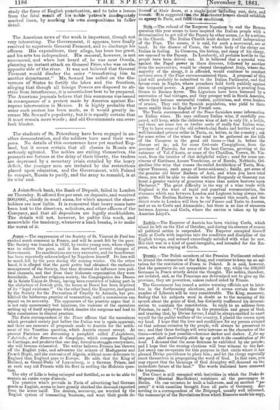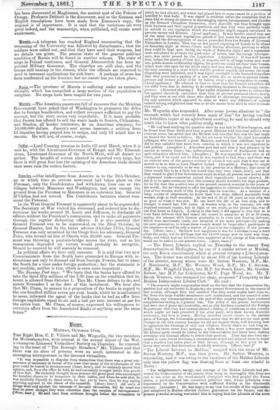rissig.—The Polish members of the Prussian Parliament refused to attend
the coronation of the King, and continue to keep,up an agi- tation for the restitution of .Posen to Poland. It is said, however, that the peasantry do not sympathize in this cry, while the.500,000 Germans in Posen utterly detest the thought. The nobles, therefore, are isolated, and, as the Prussians are determined not to give up the province, they are powerless, unless indeed aided by France.
The Government has issued a notice warning officials not to inter- fere in the forthcoming elections, and it seems certain that the number of Liberals will he very considerable. The King, moreover, finding that his subjects were in doubt as to the meaning of his speech about the grace of God, has distinctly reaffirmed his determi- nation to maintain the constitution. In reply to an address from Potsdam, he said: " Confiding in the protection and grace of God, and trusting that, by Divine favour, I shall be always enabled to exert myself for the public welfare of the country, I placed the crown upon my head. I hope that the love and confidence for my person evinced on that solemn occasion'hy the people, will always be preserved to me; and that these feelings will even increase as the character of the times—which is just possible—become darker and darker. I, for my own part, shall tatalterably abide by my oath to the constitution of tie land. I demand that the same firmness be exhibited by the people; and I hope that the coining elections will bear witness to the fact. Let every one co-operate for this purpose in that circle where it has pleased Divine providence to place him; and let the clergy especially exert themselves in propogating the word of God. In that case, you may expect that the blessings of God Almighty will descend on the immediate future of the land." The words italicised have removed the impression.
The Court is still occupied with festivities in which the Duke de Magenta (Marshal MacMahon) outshines all the personages in Berlin. On one occasion he built a ball-room, and on another " pa- pered" it with camellias brought from all parts of Germany. Ac- cording to a correspondent of the Telegraph, usually well informed, the manuscript of the Revelations from which Erasmus made his ropy, has been discovered at Maghinnen, the ancient seat of the Princes of Orange. Professor Delitsch is the discoverer, and as the German and Enghsh translations have been made from Erasmus's copy, the original is of importance. It is said that the variations are very great indeed, and the manuscript, when published, will create some excitement.































 Previous page
Previous page